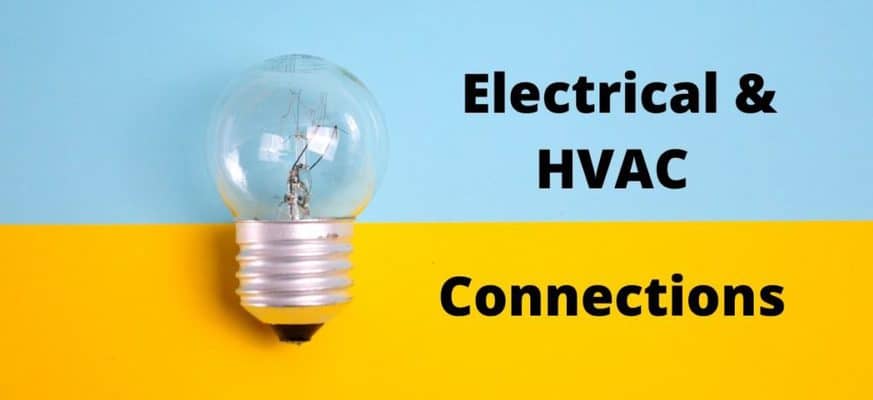Electrical and HVAC installation needs early attention in the overall construction planning process. This will avoid having to change plans and location later. When you are in the process of buying your home it is a really good idea to have some prior knowledge of the electrical service supply available on your land or inside the registered mobile home park.
Mobile Home Electrical and HVAC Installation.
Table of Contents
Many older mobile home parks have 75/100/150 amp services which are not adequate for the expected loads in a modern manufactured house.
Mobile homes being made now are a far cry from the trailers made in 1950 and 1960 where the amenities were very basic and essential, just enough to get by and be reasonably comfortable:
Small stove perhaps a window ac unit and no clothes dryer.
Today’s Higher Load Consumption.
However, the new mobile homes are set up exactly like a conventionally constructed house and homeowners expect all of the modern conveniences to be available if not already fitted.
The main loads are:
- Water heater
- Dishwasher
- Tumble dryer
- Cooker/stove
- Washing Machine
- Air conditioning
Other extra loads comes from:
- Computers
- Phones
- Printers
- Fax Machines
- Modems
- High Definition Television
- High Power Sound Systems
You May Need A Supply Upgrade.
Your mobile home licensed contractor should be able to advise you on the available power supply well before you purchase the home from the dealer or direct from the factory.
New mobile homes are usually rated for a 200amp service supply to the internal breaker and there is a potential danger of overloading present if they are not connected to an adequate supply.
This means that either the supply needs to be upgraded or the load inside of the home reduced. If this is not possible then some of the appliances will need to run on modern propane or gas supply in your area. These decisions need to be made before ordering your home so that changes can be made inside the factory before the building process has started.
Must Read: How To Install A New Mobile Home Anchor – Full Instructions.
When Will My Electrical and HVAC installations be Connected?
Once the mobile home is blocked/anchored it needs to pass the initial “tie-down” inspection. Next comes the plumbing water and sewer.
At this point the home will be to be connected to an electrical supply and air conditioner unit. The HVAC unit maybe with conventional with ductwork running to the outside condenser. There has been a move recently to install a split or mini-split systems. These do not require large ductwork to be run under the house.
Connecting the Electrical Supply to the Local Utility Company
If the home is in a park the electrical service is usually via a 100amp / 150amp service box feeding a meter. However if the home on vacant land the electrical contractor will need to install a service pole which in turn will be connected to a transformer by the local utility company.
The supply size is usually 200 amps on new houses which will have a larger power demand due to larger a/c units, ovens, and tumble dryers.
The lines from the service pole to the home are buried into a trench and the homeowner will be responsible for these charges.
Mobile Home AC unit and HVAC installation Considerations.
The AC on most mobile homes is fed from the outside of the home by flexible ductwork. These self-contained units are usually brought to the site by the HVAC contractor. Some newer homes do have a split system with just the condenser outside and the main unit installed by the factory inside the manufactured home. Split systems are usually easier and cheaper to install.
Electrical and AC Permits for your Home
It is the responsibility of the electrical and HVAC subcontractors to ensure that their work is performed according to local and state code.
The subcontractor permits will be issued to the installation contractor as part of the setup permit. Most setup contractors will work with the same subs on a regular basis
Moving into your New Manufacture Home
It is essential for the dealer or set up contractor to arrange these services in a timely manner to prevent unnecessary delays in the overall project. The homeowner may not move into the home until everything is completed and a certificate of occupancy issued by the governing local building department.
When Will I be Able to Move In?
Once all of the construction has been completed and the permit department has carried out their inspections a certificate of occupancy is usually issued to the homeowner this will among other things authorizes the power company to make the final connection to the mobile home.
Moving into our home could be the same day.
Also Check: How to Repair a Mobile Home Floor

